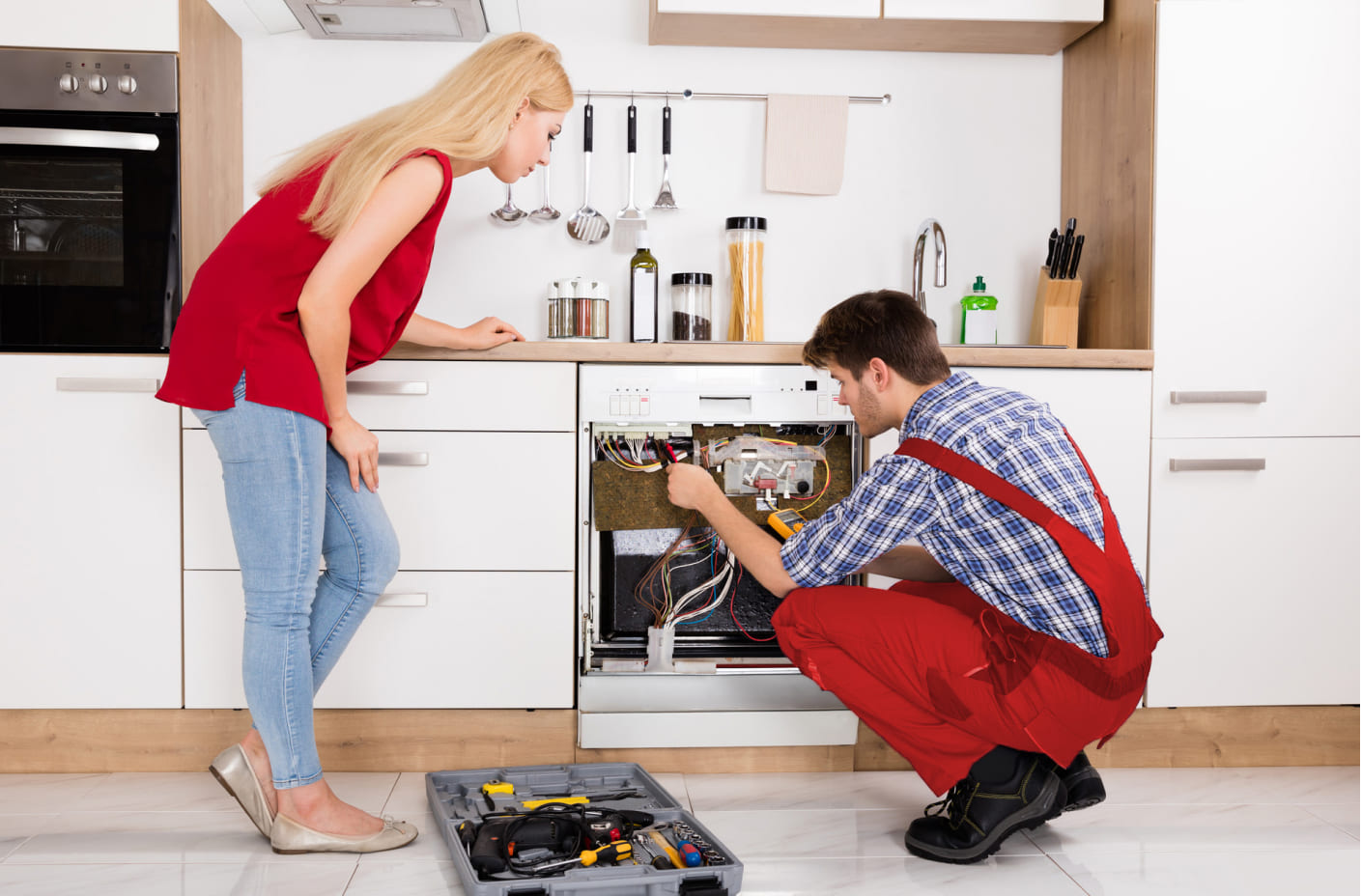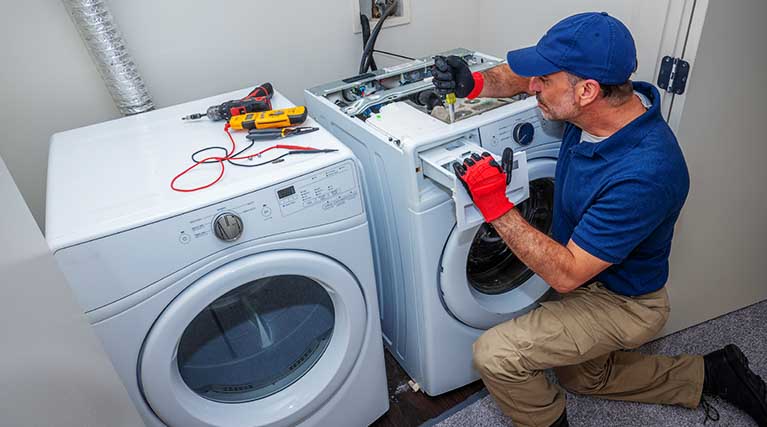The Ultimate Overview to Understanding Appliance Repair at Home
When your fridge quits cooling down or your oven declines to warm, it can really feel overwhelming. Comprehending device repair in your home can conserve you time and money. You'll discover to identify signs, use essential tools, and follow a methodical troubleshooting process. Before you start, there are crucial safety and security preventative measures you require to take right into account. What are the most usual troubles, and just how can you repair them? Let's explore the fundamentals.
Typical Device Troubles and Their Signs and symptoms
When your appliances start acting up, it's necessary to recognize the indicators at an early stage. Neglecting them can bring about bigger problems and pricey repair work. If your refrigerator isn't cooling correctly, you might observe warm places or condensation developing. This could show a falling short compressor or an obstructed vent.Your dish washer may show problems via unclean recipes or unusual sounds throughout cycles. If you hear grinding or clanking, it's time to investigate.A cleaning equipment that will not spin or drain pipes can leave you with soggy washing, suggesting a stopped up drain or a malfunctioning pump.Lastly, if your stove's temperature seems off or it takes forever to preheat, you could be handling a faulty thermostat. By remaining alert to these signs and symptoms, you can attend to concerns prior to they intensify right into major repairs.
Vital Tools for Device Repair
When you're tackling appliance fixings in the house, having the right tools is important. Basic hand devices like screwdrivers and pliers will aid you disassemble and deal with numerous home appliances, while electrical testing tools guarantee you're functioning safely with electrical wiring. Let's look at what you require to start on your repair service trip.
Standard Hand Devices
Having the right devices is crucial for effective appliance repair work at home. Start with a trustworthy screwdriver collection, including both flathead and Phillips types, as screws are typical in home appliance assembly. Pliers are additionally essential; they aid with gripping, twisting, and reducing cables or small parts. A pair of needle-nose pliers can reach difficult situations quickly. You'll need an excellent adjustable wrench for tightening or loosening nuts and screws. An utility knife is handy for puncturing packaging or insulation. Ultimately, do not fail to remember a tough workbench or surface to securely organize your tools and parts. With these fundamental hand devices, you'll be well-prepared to take on most appliance repair services that come your way.
Electrical Testing Instruments
Along with basic hand devices, electrical screening gadgets play an essential role in home appliance repair service. These devices aid you detect electrical problems and warranty home appliances function securely. A multimeter is vital; it determines voltage, existing, and resistance, enabling you to pinpoint issues promptly. A non-contact voltage tester is one more must-have, letting you detect real-time wires without making straight get in touch with, enhancing your security. Secure meters are great for gauging current flow in cables without separating them, saving you time and initiative. Additionally, circuit testers can swiftly examine if electrical outlets are working effectively. By utilizing these gadgets, you'll streamline your troubleshooting procedure and improve your repair service abilities, making device maintenance a great deal less complicated.
Step-by-Step Overview to Diagnosing Device Issues
When your home appliance breaks down, it can be frustrating, yet diagnosing the issue doesn't have to be overwhelming. You'll learn to identify usual troubles and use effective fixing strategies. Allow's stroll through the actions to obtain your appliance back in working order.
Common Appliance Problems

Troubleshooting Techniques Described

Fixing Significant Kitchen Appliances: A Closer Look
Have you ever before wondered how to deal with typical issues with your kitchen area home appliances? Fixing major kitchen area appliances like refrigerators, ovens, and dish washers can be less complicated than you believe. Beginning by identifying the trouble-- whether it's a refrigerator not cooling or a stove that won't heat up. Often, a basic reset or checking the power source can fix the issue.For fridges, clean the condenser coils and examine the door seals. If your oven's not heating, examine the burner and thermostat. Dish washers might just require a tidy filter or a reset to obtain them back at work. Always unplug the device here prior to diving right into repair services to guarantee your safety.Don' t forget to seek advice from the customer guidebook for particular repairing suggestions associated with your version. With a little bit of perseverance and the right devices, you can confidently deal with home appliance repair work and save money at the same time!

Fixing Washing Appliances: Tips and Techniques
When your washing home appliances start breaking down, it can really feel frustrating, however repairing them doesn't have to be a hassle. Start by inspecting the power supply. Confirm the home appliance is connected in and the electrical outlet is working. Next off, examine the door or lid button; a malfunctioning button can prevent the machine from operating.For washers, if it's not spinning, check for unbalanced tons. Rearranging the garments may fix the issue. If your dryer isn't heating, clean the lint filter and check the vent for blockages.Listen for unusual noises; they can indicate a problem. If your device is leaking, inspect the pipes for splits or loose connections. Record any type of error codes presented on electronic displays, as they can lead you in determining the problem. Seek advice from the customer handbook for particular repairing ideas related to your version.
Safety And Security Precautions to Take During Fixes
Prior to you start any type of device repair work, it's vital to prioritize security to avoid mishaps or injuries. Unplug the device or transform off the circuit breaker to ensure no power reaches it while you function. Use shielded tools to decrease the threat of electric shock. Put on security goggles and handwear covers to safeguard on your own from sharp edges or debris (Dependable Refrigeration & Appliance Repair Service Washing Machine Repair).Make particular your work area is clean and well-lit, so you can see what you're doing. Maintain children and family pets away from the location to stay clear of diversions and possible dangers. If you're handling gas devices, be extra careful; check for leaks prior to proceeding.Take your time, and do not rush with repairs. If you feel unclear regarding any kind of step, it's better to pause and study than to guess. Adhering to these precautions will help produce a much safer environment for your DIY appliance repair work project
When to Call a Specialist for Aid
How do you understand if it's time to call in a professional for appliance repair work? If you have actually attempted basic troubleshooting without success, it's a clear sign. If your appliance still won't start or reveals uncommon noises after resetting it, don't hesitate to seek specialist help.When you see leaks, smoke, or melting smells, prioritize safety and security and call a pro instantly. These problems can result in more substantial damages or pose risks to your home.Also, if your home appliance is under guarantee, getting in touch with a specialist is usually the best route. They can guarantee that repair work won't void your guarantee, conserving you money in the long run.Finally, if you're unsure or uncomfortable with complex repair services, it's important to leave it to the professionals. Remember, taking on complex issues without the right proficiency can lead to pricey mistakes. Trust fund an expert when in doubt!
Often Asked Inquiries
Just How Can I Protect Against Home Appliance Troubles in the Future?
To avoid home appliance troubles in the future, you must execute normal upkeep, check for deterioration, clean filters, and prevent overloading. Remaining positive will assist prolong their life-span and maintain them running efficiently.
What Are one of the most Common DIY Appliance Fixing Mistakes?
You might neglect safety and security preventative measures, miss troubleshooting steps, or make use of wrong tools when attempting DIY device repair work. Hurrying the procedure or ignoring producer standards can result in more substantial concerns and pricey blunders. Keep person and educated!
How Do I Know if a Part Needs Replacement?
You can tell if a part requires substitute by looking for unusual sounds, leakages, or inconsistent performance. If the home appliance has a hard time to operate properly or shows visible damage, it's most likely time for a replacement.
Can I Utilize Generic Parts for Device Services?
Yes, you can make use of common parts for home appliance repairs, however identify they work - Lg Dryer repair near me Dependable Refrigeration & Appliance Repair Service. Common components could save you money, but they might affect efficiency or long life, so consider your options meticulously prior to choosing
What Warranties Cover Home Appliance Services?
A lot of appliance service warranties cover repair work for producing defects, but they typically exclude damage from abuse. Examine your guarantee terms very carefully, as some may require using qualified technicians and initial components for coverage to continue to be valid.
Comments on “How to Stay Safe During Appliance Repairs – Dependable Refrigeration & Appliance Repair Service Dryer repair near me”